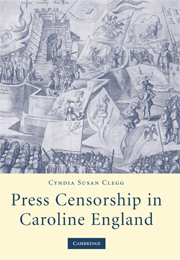Book contents
- Frontmatter
- Contents
- Acknowledgments
- Chapter 1 Censorship and the law: the Caroline inheritance
- Chapter 2 Print in the time of Parliament: 1625–1629
- Chapter 3 Transformational literalism: the reactionary redefinition of the courts of High Commission and Star Chamber
- Chapter 4 Censorship and the Puritan press
- Chapter 5 The printers and press control in the 1630s
- Chapter 6 The end of censorship
- Notes
- Bibliography
- Index
Chapter 5 - The printers and press control in the 1630s
Published online by Cambridge University Press: 22 September 2009
- Frontmatter
- Contents
- Acknowledgments
- Chapter 1 Censorship and the law: the Caroline inheritance
- Chapter 2 Print in the time of Parliament: 1625–1629
- Chapter 3 Transformational literalism: the reactionary redefinition of the courts of High Commission and Star Chamber
- Chapter 4 Censorship and the Puritan press
- Chapter 5 The printers and press control in the 1630s
- Chapter 6 The end of censorship
- Notes
- Bibliography
- Index
Summary
In 1637 the court of Star Chamber issued a decree “touching the regulating of Printers and Founders of letters.” The preamble to the decree acknowledges that in the twenty-eighth year of Queen Elizabeth's reign “and before” “divers” decrees and ordinances had been made for “the better government and regulating of Printing and Printers”; experience, however, had shown these decrees to be defective in some respects. Furthermore, according to the preamble, new abuses had arisen since then. The 1637 Star Chamber Decree serves as an important benchmark in any discussion of Caroline press controls, although the nature of its inception and intention are contested. Before turning to the decree and the dispute that surrounds it, understanding the conditions in London print culture during the reign of Charles I can help us to better understand both how new abuses could arise and how earlier decrees may have proven defective. The Elizabethan decrees had responded to external challenges to the authority both of the Stationers' Company's monopoly and of royal patents, as well as to complaints from the journeymen printers about insufficient work. In the seventeenth century, although economic problems persisted, circumstances differed. Outside challenges to the Stationers' monopoly posed less of a problem than structural changes within the company – both economic and regulatory. The seventeenth century also saw an important generic change that required increased government oversight – the emergence of news publications (“corantos”).
- Type
- Chapter
- Information
- Press Censorship in Caroline England , pp. 186 - 207Publisher: Cambridge University PressPrint publication year: 2008
- 1
- Cited by



